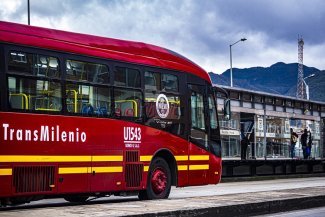
“A historic record was once again reached at the end of 2019, with 79.5 million people forcibly displaced from their homes and places of origin – people just like us, with very similar lives, needs and aspirations, but for whom concepts such as a dignified life, a home, rights, stability, wellbeing, security... are now just empty words.” Recent arrivals pictured at a registration centre in Lampedusa, Italy.
The contrast could not be starker. On the one hand, there are the repeated declarations of concern and condolences in the face of each new human tragedy, and even promises, such as that just given by the European Commission president, Ursula von der Leyen, that the European Union’s (EU) asylum and migration policy will be “humane” and based on “mutual support”. On the other, the fact that the Mediterranean has long been a huge cemetery and incidents such as the fire at the Moria refugee camp in Lesbos show how fundamentally unsupportive, securitarian and inhumane the EU’s approach actually is.
And this has been the case since 1999, when the EU laid the foundations of a common asylum and immigration policy centred on the policing of its internal and external borders and on cooperation between member states to share the burden, while claiming to be committed to joining forces to ensure fair treatment for foreigners who set foot on EU soil and to fight the organised crime rings that traffic in despair. This legitimate yet questionable and inadequate approach has given rise to short-sighted and utterly despicable nationalism among governments obsessed with not losing control of their borders and driven by the fear that their political opponents might make electoral capital of any measure consistent with the principles that define us as full democracies.
Consequently, as part of a desperate and suicidal “every man for himself” approach, many have chosen to make a show of pushing forward an eminently securitarian policy that is ultimately limited to managing the consequences of one mistake after the other.
These mistakes start with an exercise in self-induced amnesia leading us to forget our history of shared responsibility in contributing to situations that ultimately create ever-larger waves of forced displacement.
The current population flows into the EU are often the result of long-standing Western interference (geopolitical and geoeconomic), that has no regard for the wishes and needs of the local people. And this is not confined to what happened during a colonial era that has formally come to an end, but extends to practices that continue today, and which include the ruthless exploitation of foreign resources and support for rulers who are more intent on defending their own personal and corporate interests than on looking after the interests of their fellow citizens.
This predatory model of relations is complemented by a dogged commitment to EU border policing (with Frontex at the head) and the use of force to stop those who seek to reach what they wrongly perceive as the European paradise. The picture is completed by a new lack of regard for the most basic rules of maritime law, international humanitarian law and the commitments made by each of the 27 when they signed the 1951 Refugee Convention, all of which oblige them to assist and protect persons who seek to save their lives by fleeing a situation of violence or natural disaster.
The last pillar of this securitarian approach is to ensure the collaboration of transit country governments, which – in exchange for political and economic support – are called on to assist in thwarting these attempts to reach an idealised Europe and, to take in forced returnees from amongst those who nonetheless managed to get there – a policy the EU implements despite knowing full well that this means leaving them in the hands of those who will show very little concern about covering their basic needs and dealing with their requests.
This approach is not only censurable for all that it entails in terms of neglect of duty, non-compliance with international commitments and collaboration with the endless atrocities committed by mafias and governments, but also, and all the more so, for the simple reason that it does not work. And in the meantime, as the United Nations High Commissioner for Refugees reminds us, a historic record was once again reached at the end of 2019, with 79.5 million people forcibly displaced from their homes and places of origin – people just like us, with very similar lives, needs and aspirations, but for whom concepts such as a dignified life, a home, rights, stability, wellbeing, security... are now just empty words.
Fortress Europe can no longer afford to ignore what is happening outside its walls
If only because we have already learned that despair and the desire for a dignified life cannot be stopped by border police or walls, no matter how high or intimidating they may seem, we ought to draw an alternative path which, in accordance with our principles and obligations, at least takes into account the imperative need:
- For a political education drive to debunk the myths and misinformation and present a fair and real picture of the actual situation. This means recalling the fact, for example, that no more than 250 million people live permanently in a country other than the one in which they were born; in other words, only 3.3 per cent of the world’s population. And to debunk the myth of an invasion, so effectively peddled by populists, it is sufficient to recall that nine out of every ten African and eight out of every ten Asian migrants move to another country on their own continent. Similarly, to counter the argument that they place an excessive burden on the state’s coffers, there is ample data demonstrating that they contribute much more to the host states than they receive through social policies, both thanks to their contribution to the labour market and public revenues, via taxes, and the rejuvenation of populations as old as those in the EU-27.
- To explore another path, with a perspective that must be multilateral and multidimensional, which seeks the full integration, social, political and economic, of those already in the EU, whilst combating xenophobia with an educational approach that must be led by the public authorities, education systems and the media, and that gives substance to the concept of equal opportunities. It also means using some of the enormous resources at our disposal to alleviate the hardships people face, be it in their home or host countries, reopening the possibility of being able to submit asylum and refugee applications to the consulates and embassies of any country in the European Union from their home countries, rather than having them risk their lives by placing them in the hands of murderous mafias so that they can physically submit their applications in the destination country.
- To understand, finally, that the problem is not them coming, but them not coming. Given the EU’s demographic situation and prospects, which can be summarised as low natural population growth and increasing ageing, we clearly ought to acknowledge that we need people to come, not that this means that they alone represent the solution to the problem. At the same time, to avoid the inevitable repercussions of uncontrolled population flows, we need to examine how we can contribute to creating dignified living conditions for people, no matter where they live. One conclusion we can quickly draw is that the developed countries’ commitment, as mythical as it is unfulfilled, to devote 0.7 per cent of their GDP to developing countries is not enough. It is essential that we rethink the current trade model, aspiring to make it truly fair, along with the discriminatory international financial architecture of our time, our management of the foreign debt improperly accumulated by many developing countries (or, rather, those ruling them) or the barriers to technology transfer, creating gaps that are crippling entire regions.
And so, if only out of wise selfishness, a project should be built that is very different from the present one, a project that understands that it is impossible, in our present-day world, to create an impenetrable fortress within which we can hide and ignore what is happening outside. For the sake of our own development and safety, it is therefore essential that we contribute directly to the development and safety of those around us. For the moment, what the European Commission has just presented (on 23 September), under what it has magniloquently named the New Pact on Migration and Asylum seems to have grasped the nettle (abolishing the Dublin Regulation; establishing a solidarity mechanism...). It remains to be seen whether the member states, which hold the bulk of the responsibility and real powers in this area, are prepared to implement it.









